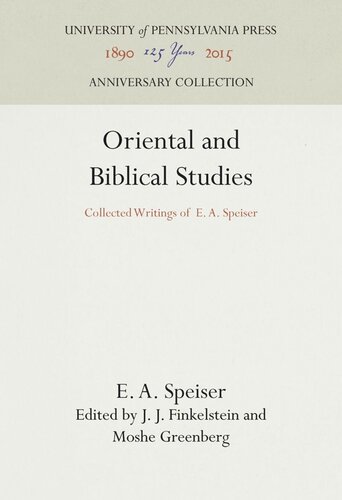

Most ebook files are in PDF format, so you can easily read them using various software such as Foxit Reader or directly on the Google Chrome browser.
Some ebook files are released by publishers in other formats such as .awz, .mobi, .epub, .fb2, etc. You may need to install specific software to read these formats on mobile/PC, such as Calibre.
Please read the tutorial at this link: https://ebookbell.com/faq
We offer FREE conversion to the popular formats you request; however, this may take some time. Therefore, right after payment, please email us, and we will try to provide the service as quickly as possible.
For some exceptional file formats or broken links (if any), please refrain from opening any disputes. Instead, email us first, and we will try to assist within a maximum of 6 hours.
EbookBell Team

5.0
48 reviewsRarely has mastery of a field been combined with such style and lucidity as in the writings of E. A. Speiser. For forty years before his death, in 1965, Dr. Speiser, the renowned author of the Anchor Bible Genesis, was a leading American orientalist. Speiser was at home in the modern as well as the ancient Near East and knew its many cultures intimately. His wide-ranging biblical studies are informed with a profound knowledge of Assyriology, and to both he brought the insights of a brilliant comparative linguist. Speiser's unique vision of the whole of ancient Near Eastern culture resulted in several classic syntheses that are included in these pages.
Collected in this volume are thirty-six of his now difficult-to-obtain articles. The reader will discover papers that deal not only with biblical studies and linguistics but also with the civilizations of Mesopotamia, Syria, and Palestine; with law and political science; and with intellectual and social progress in the ancient Near East.
"Speiser insisted on the simultaneous concentration upon analysis and synthesis; the first without the second he deemed sterile, the second without the first an empty playing with words. . . . [This insistence], so eloquently exemplified in his own work was . . . the most distinctive and certainly the most enduring part of his legacy as a teacher (from the Appreciation, by J. J. Finkelstein).
E. A. Speiser was born in Galicia in 1902. After his graduation from the College of Lemberg, Austria, in 1918, he came to the United States, arriving in 1920. He received his M.A. degree from the University of Pennsylvania in 1923 and Ph.D. degree from Dropsie College, Philadelphia, in 1924. During World War II, Speiser was the chief of the Near East section, research and analysis branch of the Office of Strategic Services. Following the war, in 1947, Speiser was named chairman of the Department of Oriental Studies at the University of Pennsylvania. In 1954 he became Abraham M. Ellis Professor of Hebrew and Semitic Languages and Literatures at the University. One year prior to his death, he was named University Professor of Oriental Studies, the highest honor that the University of Pennsylvania awards to distinguished faculty members.
Those familiar with one or another aspect of Speiser's contribution will find here a selection and arrangement designed to capture the underlying unity in approach that informed all of his work. And the nonspecialist cannot help but discover the broader, humanistic implications of oriental studies.